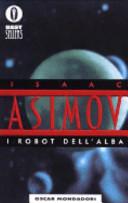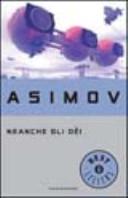Origine: Citato in Isaac Asimov e Jason Shulman, Isaac Asimov's Book of Science and Nature Quotations https://books.google.it/books?id=dHFbHQAACAAJ, Weidenfeld & Nicolson, 1988, p.281, ISBN 1555844448
Lavori
Isaac Asimov frasi celebri
“Se la conoscenza può creare dei problemi, non è con l'ignoranza che possiamo risolverli.”
Origine: Citato in Focus n. 98, pag. 188.
Origine: Da Grande come l'universo, Saggi sulla scienza.
Frasi sulla vita di Isaac Asimov
“La vita è piacevole. La morte è pacifica. È la transizione che crea dei problemi.”
Origine: Da Destinazione Cervello.
Origine: Da Fondazione anno zero, traduzione di Gianni Montanari, Arnoldo Mondadori Editore.
Frasi sul viaggio di Isaac Asimov
“Il modo più semplice di risolvere un problema è negare che esista.”
The Gods Themselves
Isaac Asimov Frasi e Citazioni
“Inoltre affermava che, per diritto di nascita, si eredita solo l'idiozia congenita.”
Origine: Da Il crollo della galassia centrale, Oscar Fantascienza, Milano, 1989<sup>12</sup>, p. 115.
Variante: Prima Legge:
Un robot non può recare danno agli esseri Umani, né può permettere che, a causa del suo mancato intervento, gli esseri Umani ricevano danno.
Origine: Formulata da R. Daneel Olivaw e da R. Giskard Reventlov e applicata per la prima volta da quest'ultimo – primo robot mentalico – al termine del romanzo "I robot e l'Impero". Ne deriva una coerente modifica della Prima legge: "Un robot non può recare danno agli esseri Umani, né può permettere che, a causa del suo mancato intervento, gli esseri Umani ricevano danno, a meno che ciò non contrasti con la legge zero".
“Se la corrente ti sta portando dove vuoi andare, non discutere.”
Origine: Da Destinazione Cervello,
The Caves of Steel
Origine: Citato in Roberto Gervaso, Ve li racconto io, Mondadori.
“Non c'è bisogno di viaggiare nel tempo per essere degli storici.”
Origine: Da La campana canora, racconto, traduzione di Roberta Rambelli, Fanucci.
Origine: Da La fine dell'Eternità, Traduzione di Giuseppe Lippi, Arnaldo Mondadori Editore; cap. 18.
Origine: Citato in Giuseppe Lippi, I robot dell'alba, Oscar Mondadori.
Tutti i miei robot, Le Tre Leggi della Robotica
Variante: Terza Legge:
Un robot deve salvaguardare la propria esistenza, a meno che ciò non contrasti con la Prima o la Seconda Legge.
I; p. 7
Il libro di fisica
prefazione; p. 3
Il libro di fisica
Isaac Asimov: Frasi in inglese
“Those people who think they know everything are a great annoyance to those of us who do.”
As quoted in The Mammoth Book of Zingers, Quips, and One-Liners (2004) edited by Geoff Tibballs, p. 299
General sources
Isaac Asimov's Book of Science and Nature Quotations (1988), edited with Jason A. Shulman, p. 281
General sources
“If my doctor told me I had only six minutes to live, I wouldn't brood. I'd type a little faster.”
Variante: If my doctor told me I had only six minutes to live, I wouldn’t brood. I’d type a little faster. Časopis LIFE, január 1984
“Properly read, it is the most potent force for atheism ever conceived.”
As quoted in Notes for a Memoir : On Isaac Asimov, Life, and Writing (2006) by Janet Jeppson Asimov, p. 58
General sources
Variante: Properly read, the Bible is the most potent force for atheism ever conceived.
Contesto: If you suspect that my interest in the Bible is going to inspire me with sudden enthusiasm for Judaism and make me a convert of mountain‐moving fervor and that I shall suddenly grow long earlocks and learn Hebrew and go about denouncing the heathen — you little know the effect of the Bible on me. Properly read, it is the most potent force for atheism ever conceived.
“What I will be remembered for are the Foundation Trilogy and the Three Laws of Robotics.”
Yours, Isaac Asimov (20 September 1973) <!-- page 329 -->
General sources
Contesto: What I will be remembered for are the Foundation Trilogy and the Three Laws of Robotics. What I want to be remembered for is no one book, or no dozen books. Any single thing I have written can be paralleled or even surpassed by something someone else has done. However, my total corpus for quantity, quality and variety can be duplicated by no one else. That is what I want to be remembered for.
"Introduction" to The Best of Isaac Asimov (1973)<!-- , p. ix -->
The Last Question (1956)
Contesto: "The Last Question" is my personal favorite, the one story I made sure would not be omitted from this collection. Why is it my favorite? For one thing I got the idea all at once and didn't have to fiddle with it; and I wrote it in white-heat and scarcely had to change a word. This sort of thing endears any story to any writer.
Then, too, it has had the strangest effect on my readers. Frequently someone writes to ask me if I can give them the name of a story, which they think I may have written, and tell them where to find it. They don't remember the title but when they describe the story it is invariably "The Last Question". This has reached the point where I recently received a long-distance phone call from a desperate man who began, "Dr. Asimov, there's a story I think you wrote, whose title I can't remember—" at which point I interrupted to tell him it was "The Last Question" and when I described the plot it proved to be indeed the story he was after. I left him convinced I could read minds at a distance of a thousand miles.
No other story I have written has anything like this effect on my readers — producing at once an unshakeable memory of the plot and an unshakeable forgettery of the title and even author. I think it may be that the story fills them so frighteningly full, that they can retain none of the side-issues.
“When you write a short story … you had better know the ending first.”
The Casebook of the Black Widowers (1980), p. 177
General sources
Contesto: When you write a short story... you had better know the ending first. The end of a story is only the end to the reader. To the writer, it's the beginning. If you don't know exactly where you're going every minute you're writing, you'll never get there — or anywhere.
"My Own View" in The Encyclopedia of Science Fiction (1978) edited by Robert Holdstock; later published in Asimov on Science Fiction (1981)
General sources
Origine: The Bicentennial Man and Other Stories
“It has been my philosophy of life that difficulties vanish when faced boldly”
Variante: It has been my philosophy of life that difficulties vanish when faced boldly.
Origine: Foundation
"The Tragedy of the Moon," The Magazine of Fantasy and Science Fiction (July 1972)
General sources
Origine: Short fiction, The Early Asimov Book One (1972), Half-Breed (p. 160)
“Never let your sense of morals prevent you from doing what is right.”
Part IV, The Traders, section 1; originally published as “The Wedge” in Astounding (October 1944)
Origine: The Foundation series (1951–1993), Foundation (1951)
"A Cult of Ignorance", Newsweek (21 January 1980) http://media.aphelis.net/wp-content/uploads/2012/04/ASIMOV_1980_Cult_of_Ignorance.pdf
General sources
Contesto: There is a cult of ignorance in the United States, and there always has been. The strain of anti-intellectualism has been a constant thread winding its way through our political and cultural life, nurtured by the false notion that democracy means that "my ignorance is just as good as your knowledge."
“Any planet is 'Earth' to those that live on it.”
Origine: Pebble in the Sky
Attributed in the "quote of the day" source code of the “Fortune” computer program (June 1987); more at "The Most Exciting Phrase in Science Is Not ‘Eureka!’ But ‘That’s funny …’" at Quote Investigator https://quoteinvestigator.com/2015/03/02/eureka-funny/
General sources
“Self-education is, I firmly believe, the only kind of education there is.”
"Science Past, Science Future" (1975) p. 208
General sources
“There are limits beyond which your folly will not carry you.”
Doctor Susan Calvin in "Robot Dreams" in Robot Dreams (1986)
General sources
Contesto: There are limits beyond which your folly will not carry you. I am glad of that. In fact, I am relieved.
Origine: I. Asimov: A Memoir (1994), Ch. 8, Library
Contesto: I received the fundamentals of my education in school, but that was not enough. My real education, the superstructure, the details, the true architecture, I got out of the public library. For an impoverished child whose family could not afford to buy books, the library was the open door to wonder and achievement, and I can never be sufficiently grateful that I had the wit to charge through that door and make the most of it.
Now, when I read constantly about the way in which library funds are being cut and cut, I can only think that the door is closing and that American society has found one more way to destroy itself.



